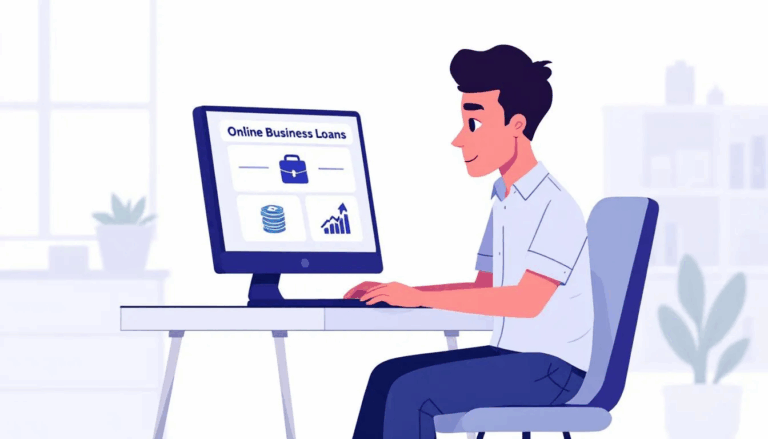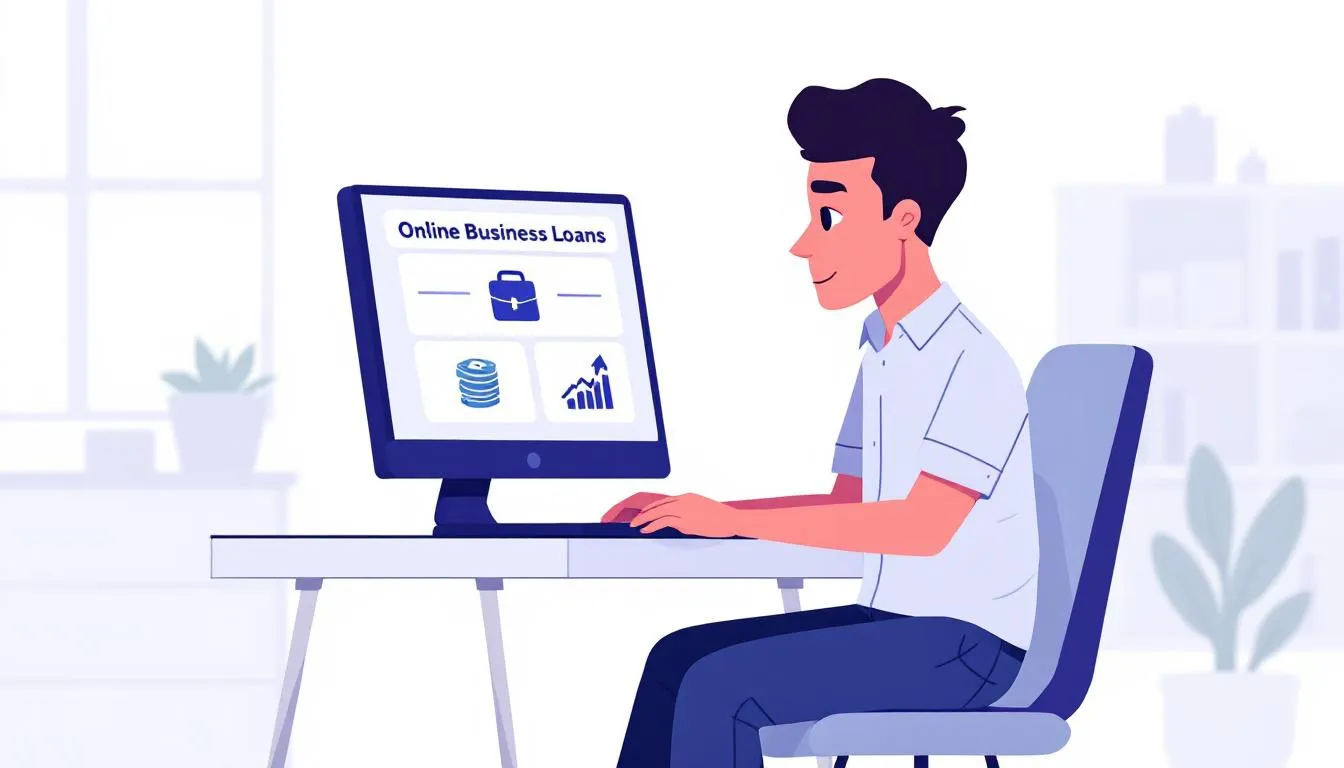What is a Small Business Loan?
A small business loan is a type of financing specifically designed to help small businesses cover expenses, invest in growth, or manage cash flow. These loans can come from traditional banks, online lenders, or government programs and are typically used for purposes such as purchasing equipment, hiring employees, or expanding operations.
Specific loan amounts, interest rates, terms, and funding speeds vary by lender and loan type. Here are some of the loan options available through our lender network. Keep in mind that funding speeds are approximate and can vary depending on documentation, lender, and more.
Business loans require a more involved process than loans for personal finance. Lenders typically require detailed information to verify a business’s financial health. Small business owners must prepare detailed business financial statements when applying.
Here are some of the most popular small business loan options.
Working Capital Loans
- Amount: $1k – $10 million
- Rates: Starting at Prime + 2.75% p/mo
- Terms: 3 months – 10 years
- Funding Speed: 1 – 3 business days
Working capital loans are a type of financing that businesses use to cover their day-to-day operational expenses. These loans are typically short-term and can help companies manage cash flow fluctuations, purchase inventory, or cover payroll costs. Working capital loans can help businesses navigate financial challenges and seize growth opportunities by providing quick access to funds.
Business Line of Credit
- Amount: $1k – $1 million
- Rates: Starting at 1% p/mo
- Terms: Up to 36 months
- Funding Speed: 1 – 3 business days
A business line of credit is a flexible financing option that allows a company to borrow funds up to a predetermined credit limit. It provides access to capital for short-term needs, such as covering operating expenses or managing cash flow fluctuations. Borrowers can draw funds from the credit line as needed and only pay interest on the funds drawn, making it a cost-effective solution for businesses looking to manage their financial obligations efficiently.
Revenue Based Financing
- Amount: $5k – $5 million
- Rates: Starting at 1-6% p/mo
- Terms: 3 – 24 months
- Funding Speed: 1 – 2 business days
Revenue based financing is a form of funding in which a company receives capital in exchange for a percentage of its future revenues. Unlike traditional loans, repayments are based on a percentage of the company’s monthly revenue, making it a flexible option for businesses with fluctuating income streams. This type of financing is often used by startups and small businesses looking for alternative funding options.
SBA Loans
- Amount: $50k – $10 million
- Rates: Starting Prime + 2.75%
- Terms: 10 – 25 years
- Funding Speed: 4 – 12 weeks
The Small Business Administration backs SBA loans to help small businesses access financing with more favorable terms. The government guarantee provides security to lenders, allowing them to offer higher borrowing amounts with low interest rates and extended terms. Business owners can use SBA loans for various purposes, such as starting a new business, expanding an existing one, or covering operating expenses.
Accounts Receivable Factoring
- Amount: $10k – $25 million
- Rates: Starting at 1% p/mo
- Terms: Up to 24 months
- Funding Speed: 1 – 2 weeks
Accounts receivable factoring is a financial transaction where a company sells its accounts receivable to a third party at a discount. This provides the company with immediate cash flow rather than waiting for customers to pay their invoices. The third party, known as a factor, then collects the payments from the customers.
Merchant Cash Advance
- Amount: $5k – $5 million
- Rates: Starting at 1-6% p/mo
- Terms: 3 – 24 months
- Funding Speed: 1 – 2 business days
A merchant cash advance is a type of alternative funding where a business receives a lump sum payment in exchange for a percentage of its daily credit card sales. This form of financing can be appealing to companies with fluctuating revenue since repayments are based on daily sales volume. However, merchant cash advances often have higher fees and interest rates than traditional loans.
Business Term Loan
- Amount: $10k – $10 million
- Rates: Starting at 1-4% p/mo
- Terms: 3 months – 10 years
- Funding Speed: 1 – 3 business days
Business term loans are a type of financing provided by banks or financial institutions to businesses for a specific amount and term. These loans are typically used for significant investments or expenses, such as purchasing equipment, expanding operations, or funding substantial projects. The borrower repays the loan in regular installments over a set period, usually with a fixed interest rate.
Equipment Financing
- Amount: Up to $10 million per piece of equipment
- Rates: Starting at 6.5%
- Terms: 1 – 10 years
- Funding Speed: 1 -2 business days
Equipment financing is a type of business loan specifically used to purchase equipment or machinery needed for operations. Equipment loans help businesses acquire necessary assets without significant upfront costs, allowing them to preserve cash flow and invest in growth opportunities. Typically, the equipment being financed serves as collateral for the loan, making it a secured form of lending.
What’s the timeline for Getting a Small Business Loan?
Getting a small business loan can take anywhere from a few business days to three months. The exact time varies based on different factors. Some loans can be approved in just a few days. Others may take longer, especially if they require more paperwork. A few online funders even offer same-day funding.
Banks and lenders have their own processes. They review applications carefully, including checking credit scores and financial statements. If everything is in order, they can speed up the process.
Loan Processing Timeline
The loan processing timeline involves several steps. Here’s what potential applicants can expect.
- Application Preparation: This step can take an average of a week or more as you gather documents like tax returns and bank statements.
- Application Submission: Once you submit your application to the lender, the review process can take several days to several weeks.
- Lender Review: The next phase in obtaining a business loan is the underwriting process. In most cases, the lender will pull your credit report. During this stage, the lender may ask for additional information, extending the timeline further.
- Decision Making: After completing their review, the lender makes a decision. If approved, you will receive an offer detailing the loan terms.
- Document Signing: Before receiving funds, you may need to sign documents. This final step can add another week to the overall processing timeline.
- Loan Disbursement: The loan disbursement process typically takes 1-7 business days after signing the loan agreement. The funds are transferred to your account once the lender has finalized and approved all necessary paperwork.
What factors influence How Long Business Loans Take?
Several factors influence the small business loan processing time.
Type of Lender
Business timelines can vary significantly depending on the type of lender you choose to work with. Different lenders have different requirements. Knowing the lender’s requirements before you apply can streamline the process.
Traditional lenders such as banks and credit unions typically have longer approval and funding times due to their extensive application processes and strict requirements. Business loans from banks are known for having low interest rates and favorable terms. However, conventional loans typically have more stringent qualifications, require more detailed financial documents, and have longer funding times.
On the other hand, online and alternative lenders offer fast business loans with minimal documentation. Online lenders generally work faster than banks or credit unions. They are often able to provide business funding within just a few business days. This faster process can benefit businesses needing quick capital to seize opportunities or address urgent financial needs. Most alternative lenders use electronic funds transfers to deposit loan proceeds quickly into your business bank account.
Credit Score of the Borrower
The borrower’s credit score can significantly impact the funding times for small business loans. A higher credit score typically results in faster approval and funding, as lenders view the borrower as less risky.
On the other hand, a lower credit score may lead to delays in the approval process or require additional documentation before funds are disbursed. Ensure you check the minimum credit score of any lender before applying. Take steps to ensure you have a strong credit history, such as paying off any outstanding debt.
Loan Amounts
The loan amount can significantly impact the approval and funding times of small business loans. More significant loan amounts may require more extensive review processes by lenders, leading to longer approval times. Additionally, funding larger loan amounts may involve more complex underwriting procedures, resulting in longer funding times than smaller loan amounts.
Smaller loans typically have shorter processing times than larger ones. Small business owners must consider these factors when applying for loans to ensure timely access to the necessary funds for their business operations.
Business Financial History and Stability
The business’s financial history and stability can significantly influence how long it takes to get a business loan. Lenders typically review this information to assess the risk of lending money to the business. The loan approval process may be quicker if the financial history shows stability and a strong track record. On the other hand, if there are red flags or inconsistencies in the financial history, lenders may require more documentation and take longer to decide on the loan application.
Collateral
Collateral plays a significant role in loan funding times as it provides security for the lender if the borrower defaults. Appraising assets for collateral can be time-consuming as it requires a thorough evaluation of the value and condition of the assets, which can lead to delays in the loan application and funding process.
For example, property appraisals for commercial real estate financing can take several weeks to complete. This careful assessment is crucial for lenders to determine the risk involved in providing the loan and ensure that the collateral is sufficient to cover the loan amount.
Loan Application Process and Paperwork Requirements
The loan application process and paperwork requirements significantly determine the timeline for securing a business loan. The more extensive and complex the paperwork requirements, the longer it may take for a loan application to be processed and approved.
Delays in gathering and submitting the required documents can prolong the loan approval timeline, impacting the speed at which a business can access the funds it needs. Therefore, streamlining the paperwork requirements and ensuring prompt submission can help expedite the business loan process.
Type of Business Loan
Funding times can vary significantly depending on the type of loan. For example, merchant cash advances are known for quick turnaround times, often providing funding on the same day the application is approved. On the other hand, government-backed SBA loans typically have longer processing times. Due to the extensive paperwork and approval process involved, they can take weeks or even months to secure funding.
How do I apply for a Small Business Loan?
You can apply for a small business loan through our lender network by following these steps:
Step 1 – Apply online in a few minutes: Use our simple online application to submit a request for business funding. If you need any help along the way, give us a call, chat, or email.
Step 2 – Get expert advice on loan options: An expert, knowledgeable account executive will walk you through all the fine details and requirements. This is to ensure you have all the info you need.
Step 3 – Finalize your application and get funded: Once your funding has been approved and closed, the lender sends the funds to your account so you can start using them to grow your business.
What are the Fastest Business Loans?
Fast business loans are designed for quick access to funds. Various types of loans offer different processing times.
Here’s a quick list of popular fast business loan options.
Online business loans: Online business loans are known for being some of the fastest options available for entrepreneurs needing quick funding. These loans often have streamlined application processes and quick approval times, allowing business owners to access the funds they need quickly to support their ventures. With online business loans, entrepreneurs can receive the financial assistance they need without the lengthy wait times associated with traditional bank loans.
Short-term business loans: Short-term business loans typically have faster funding than traditional bank loans. In many cases, businesses can receive funding within a few days or even the same day of applying for a short-term loan, making them a quick and convenient option for businesses needing immediate capital. The expedited funding process of short-term business loans can help businesses to address urgent financial needs and seize opportunities quickly.
Merchant cash advances (MCAs): Many MCA funders offer lightning-fast funding times. MCAs are the most common form of same-day funding and arguably have the quickest funding times available on the market. However, MCAs are also one of the most expensive solutions available.
Business Credit Cards: Business credit cards can be a valuable alternative resource for quick funding when traditional business loans are not readily available. With a business credit card, you can access a line of credit that can be used for immediate business expenses, providing a convenient and fast financing option. Additionally, business credit cards often come with rewards programs and benefits that can further support your business growth.
What are the benefits of Fast Business Loans?
Fast business loans offer entrepreneurs quick access to funds for unexpected expenses or opportunities. Unlike traditional banks that may take weeks to approve a loan, fast loans can be processed in just a few days or even hours, allowing businesses to act swiftly.
Responsive financing advisors provide tailored guidance through the application process, ensuring businesses receive the support they need. With flexible repayment terms and options for different types of companies, fast loans help alleviate financial stress and maintain cash flow.
The simplified paperwork requirements also make the process efficient, enabling business owners to focus on operations. Timely repayments on fast loans can also improve credit scores, opening up more financing opportunities in the future.
What are the drawbacks of Fast Business Loans?
Quick business loans may appear attractive due to their fast access to funds, but they have several drawbacks. High interest rates, typically 10% to 30%, can make repayment challenging, especially for businesses with tight cash flow.
Loan amounts are often limited, hindering growth opportunities. Short repayment terms for a quick business loan create pressure to generate revenue quickly, risking debt if deadlines are unmet. Hidden fees, such as application fees and prepayment penalties, can increase the overall cost of the loan.
Predatory lending practices may target businesses with poor credit, trapping them in debt cycles. Limited flexibility in fund usage restricts financial management. Quick approval does not guarantee quality service or support post-loan acquisition, potentially leading to communication issues.
Fast Business Loan Pros & Cons
Pros:
- Quick access to funds for unexpected expenses or opportunities.
- Processed in just a few days or even hours.
- Tailored guidance through the application process.
- Flexible repayment terms and options.
- Simplified paperwork requirements.
- Timely repayments can improve credit scores.
Cons:
- High interest rates.
- Limited loan amounts.
- Short repayment terms create pressure.
- Hidden fees like application fees and prepayment penalties.
- Predatory lending practices may target businesses with poor credit.
- Limited flexibility in fund usage.
Frequently Asked Questions
Here are the most common questions about how long it takes to get a business loan.
Why do Business Loans from the bank take so long?
Bank business loans often take a long time due to the rigorous application process that includes extensive documentation, credit checks, and financial analysis. Banks must ensure that the borrower is a low-risk investment and can repay the loan in full and on time.
This thorough evaluation process can lead to delays as banks carefully review each aspect of the loan application. Additionally, banks may have specific criteria and regulations to meet before a loan can be approved, further contributing to the lengthy approval process.
The time-consuming nature of bank business loans is designed to protect the financial institution and ensure it makes sound lending decisions. While this process can be frustrating for borrowers, it is ultimately in place to safeguard the bank’s and the borrower’s financial well-being.
How long does the SBA Loan Process take?
Obtaining an SBA loan can be time-consuming due to the extensive paperwork and thorough evaluation required. The SBA loan application process typically involves extensive paperwork.
On average, SBA loans usually take 30 to 90 days from application to funding. However, the timeline to get an SBA loan can vary depending on several factors, such as the complexity of the application, the lender’s processing speed, and any additional documentation needed.
The initial step in the SBA loan approval process involves completing the loan application and gathering all necessary financial documents, which can take a few weeks. Once submitted, the lender will review the application, conduct a credit check, and assess the borrower’s eligibility for the loan. This evaluation process can take several weeks to complete.
After approval, finalizing the loan terms and closing the deal can take an additional few weeks. While the process may seem lengthy, the benefits of an SBA loan, such as low interest rates and favorable repayment terms, make it a worthwhile option for small businesses needing financing.
SBA 7(a) loans typically take 60 to 90 days to complete the entire process. SBA 504 loans can take 30 to 90 days to receive funding. Businesses usually use SBA 504 loans for commercial property or other fixed assets. Loans involving commercial real estate generally require more time due to appraisals and reviews.
Preferred lenders with SBA authorization can process applications faster than traditional banks. SBA Express loans have shorter processing times than other SBA loans. SBA microloans can be approved and funded within 30 to 60 days.
What can I do to Speed Up the Business Loan Process?
Long loan processing and funding times can be frustrating, especially when dealing with an urgent situation or trying to capitalize on a time-sensitive opportunity. While some factors that can delay a business loan are beyond your control, here are some crucial strategies to help expedite the process.
Prepare Documents: Gathering the required documentation is crucial. Lenders often require several documents and financial statements to process a loan. Having these ready can save time.
Organize your paperwork in advance, including recent bank statements and proof of income. If you provide all necessary documents upfront, the loan process will be faster. Applying for a loan early in the week can help it get processed faster.
Be prepared with the following documents:
- Personal tax returns
- Business tax returns
- A business plan with detailed financial projections
- Profit and loss statements (P&L statements)
- Balance sheets
- Business license
- Business bank account statements (to verify annual revenue)
- Inventory reports
- A/R & A/P reports
Explore Alternatives: Consider different alternatives to traditional loans. Online lenders may offer quicker approvals than banks and often have less strict requirements—research various options before applying.
Look into peer-to-peer lending as an alternative. This method connects borrowers directly to investors. It can lead to faster funding compared to traditional methods. Choosing the right loan program can help you get funding faster.
Make a Deposit: Some lenders ask for a deposit before approving a loan. This shows your commitment to the loan process, and making a deposit might speed up your application.
Check if the lender requires this step. If they do, be prepared to act quickly. A timely deposit can help move your application along.
Know Your Credit Score: Understanding your creditworthiness is essential for speeding up the process. Lenders look at credit scores and business history when determining rates. Knowing your credit score helps you understand what to expect.
If your score needs improvement, take steps before applying. Pay off outstanding debts or correct errors on your report. A better score may lead to quicker approval.
Build Relationships: Building relationships with lenders can also help speed up the process. If you have worked with a lender before, they may prioritize your application. Establishing trust can make them more willing to assist you.
Communicate openly about your needs and timeline. A good relationship can lead to better service during the loan process.
Stay Responsive: Quick responses are vital during the loan application process. Lenders may sometimes need additional information or clarification. Answer lender requests promptly to avoid delays.
Set reminders for follow-ups and deadlines related to your application. Staying engaged shows that you are serious about securing the loan.
How Long Does It Take to Get a Business Loan – Final Thoughts
Navigating the world of small business loans can be tricky. Knowing how long it takes to get a loan helps you plan better. Each type of loan has its own timeline, and lenders vary in their processes.
Stay informed and prepared to speed up your application process. Your business deserves the right financial support at the right time. Research your options and find a loan that fits your needs.
Contact us if you have more questions about business financing timelines or to apply for a small business loan. Our alternative financing experts can help you find the best funding solutions for your needs and timeline.













